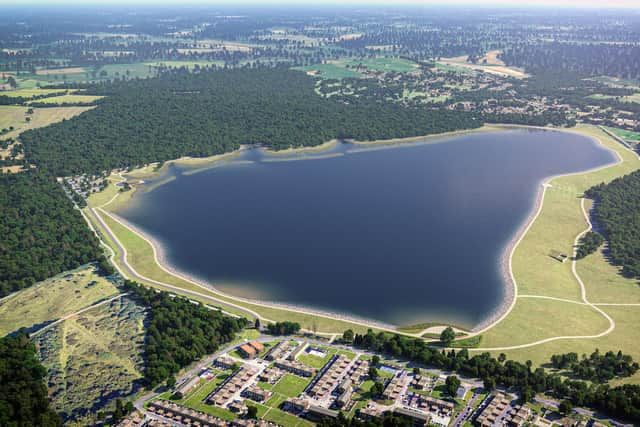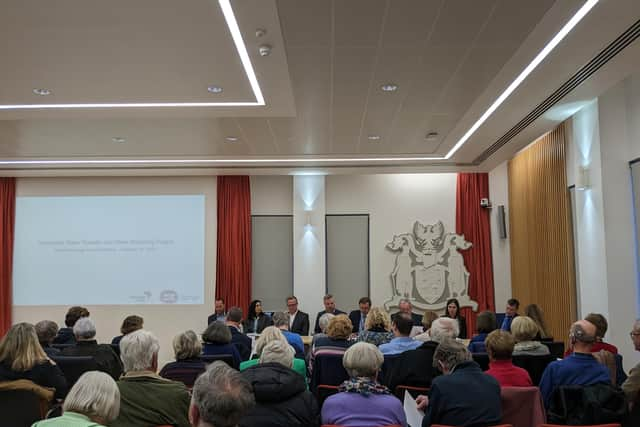Havant Thicket Reservoir: Southern Water and Portsmouth Water insist using recycled wastewater is the only way forward
and live on Freeview channel 276
That was the message from Southern Water and Portsmouth Water bosses who are adamant that recycling wastewater into the forthcoming Havant Thicket reservoir is by far the best way forward to maintain water supplies.
In a public meeting hosted by Havant Borough Council, water company executives outlined their plans to pump recycled wastewater water into the reservoir.
Advertisement
Hide AdAdvertisement
Hide Ad

The proposal would send treated wastewater to a recycling facility where it would go through a series of treatment processes before being pumped into the reservoir. It has proved controversial with several groups opposed to the idea.
Jim Barker, head of resources for Portsmouth Water said the project is in response to the south east being ‘water stressed’.
‘We have a growing population and also with climate change we have an environment that is fairly unique,’ he said.


‘We have an environment which is coming under increasing stress because we’re seeing different changes in rain patterns. So the water we take today may not be suitable to take tomorrow or in 10 years to maintain the health of our rivers.
Advertisement
Hide AdAdvertisement
Hide Ad‘What we’re looking to do is balance the stress of demand, how much water we need to supply, versus supplying the amount of water we have available without causing environmental damage.
‘We are looking at a deficit of 2.7bn litres of water by 2075 in the south east a whole so we are looking for different ways to close the gap.’
Varsha Whylie, Southern Water’s principal process scientist added that the technology is ‘not new’ as it’s ‘practised over decades in places like California, Australia and Singapore’.
The first public question commented on public trust in Southern Water after a High Court judge described the company as ‘criminal’ and it was fined £90m in a prosecution case in 2021.
Advertisement
Hide AdAdvertisement
Hide AdSam Underwood, Southern Water’s senior stakeholder manager admitted ‘there is an issue of trust here’.
He said: ‘There’s no escaping Southern Water’s reputation because of some of the incidents and issues in the past.
‘I have been in Southern Water for 13 years and I have seen the biggest period of change in the last five years and for the better.
‘I would not be sitting here today and neither would my colleagues defending Southern Water’s honour if we didn’t know that it was worth defending and if we weren’t sure that everyone is fully committed to protecting the environment.’
Advertisement
Hide AdAdvertisement
Hide AdAnother question raised concerns over how water quality would be monitored in the new reservoir.
Mr Underwood said he would like to have ‘live telemetry’ or automatic measurement and transfer of water quality data.
‘It could be hosted on our website so you can see the water quality going into the reservoir,’ he said.
‘I don’t want a phone call every time there’s a dead fish in the reservoir or a bit of algae and then there’s an assumption that there’s an issue with water quality.
Advertisement
Hide AdAdvertisement
Hide Ad‘There’s no way that water will be going into the reservoir if it wasn’t meeting the stringent standards.’
On the question of funding and whether profit is a driver for the water recycling project Sam Underwood said: ‘Protecting the rivers and serving customers is the driver for this project, not company profits.
‘The cost to the project, we’re talking hundreds of millions of pounds, the costs of water supply schemes are spread across our customers across our region.
‘Water recycling uses less power than desalination – about ten per cent of the power – and produces twice as much water.’
Advertisement
Hide AdAdvertisement
Hide AdWhen asked about alternative options to water recycling and whether they have been fully explored, Mr Underwood said: ‘We’re looking at a number of different schemes here. We’ve got a whole suite of schemes coming online in Hampshire over the next 75 years.
‘We have fully explored alternative solutions, we’ve been through a really detailed options appraisal process looking at a range of solutions to find 90m litres of water a day that’s not from a river or an aquifer and from the desalination consultation, not from the sea.
‘Wastewater from homes is 97 per cent water – from toilet flushing, from showers from baths.’
A question, aimed at Havant Borough Council, asked whether it has turned a ‘blind eye’ in allowing Southern Water to be involved in the reservoir project.
Advertisement
Hide AdAdvertisement
Hide AdCouncillor Alex Rennie, leader of the council reminded attendants that the project will be decided through the development consent order.
He said: ‘We are not the decision-makers in this process, it’s a national infrastructure project, it’s not going down the town and country planning act as the original reservoir project did.
‘A decision was taken by Southern Water to go down the national infrastructure route.
‘We are one of the consultees in this consultation so that’s why we’re making sure residents’ views are heard and representing your feelings.’
Advertisement
Hide AdAdvertisement
Hide AdIan Frost, Southern Water’s planning and consenting lead said: ‘The scheme affects eight different authorities – the development consent order process provides an opportunity to consolidate the planning process through one body. There will be multiple opportunities for people to provide feedback as it’s developed.’
When asked why water recycling is necessary for the reservoir, which was originally proposed to be filled with surplus spring water, Mr Underwood said: ‘The reservoir will hold 8.6bn litres which will be fed by spring water. Currently there is excess water which is surplus to Portsmouth Water’s needs and that water flows out into Langstone Harbour and is wasted.
‘That spring water is ephemeral as it runs during wet weather. In dry weather, the springs will fall away and that water won’t be available to be pumped into the reservoir. This scheme is a drought scheme – it’s about maintaining supplies during a drought by supplementing the reservoir.’
A third consultation will be held towards the end of this year to give people a further opportunity to provide feedback on the scheme.
Pre-application consulation and public engagement will be last until 2025, when the development consent order application is submitted.